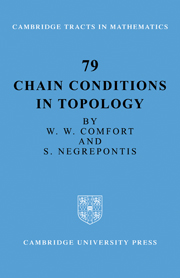Book contents
- Frontmatter
- Contents
- Introduction
- ERRATA
- Acknowledgements
- 1 Some infinitary combinatorics
- 2 Introducing the chain conditions
- 3 Chain conditions in products
- 4 Classes of calibres, using Σ-products
- 5 Calibres of compact spaces
- 6 Strictly positive measures
- 7 Between property (K) and the countable chain condition
- 8 Classes of compact-calibres, using spaces of ultrafilters
- 9 Pseudo-compactness numbers: examples
- 10 Continuous functions on product spaces
- Appendix: preliminaries
- References
- Subject index
- Index of symbols
6 - Strictly positive measures
Published online by Cambridge University Press: 05 November 2011
- Frontmatter
- Contents
- Introduction
- ERRATA
- Acknowledgements
- 1 Some infinitary combinatorics
- 2 Introducing the chain conditions
- 3 Chain conditions in products
- 4 Classes of calibres, using Σ-products
- 5 Calibres of compact spaces
- 6 Strictly positive measures
- 7 Between property (K) and the countable chain condition
- 8 Classes of compact-calibres, using spaces of ultrafilters
- 9 Pseudo-compactness numbers: examples
- 10 Continuous functions on product spaces
- Appendix: preliminaries
- References
- Subject index
- Index of symbols
Summary
We study in this chapter the condition of the existence of a strictly positive measure and its relation to the countable chain condition and to related conditions of calibre. A result of Kelley (Theorem 6.4) gives a condition (Kelley's property (**)) on the set of non-empty, open subsets of a compact, Hausdorff space which is necessary and sufficient for the existence of a strictly positive measure; we show by simple examples, given by Argyros, van Douwen, Koumoullis and Sapounakis, that not every completely regular, Hausdorff (non-compact) space satisfying Kelley's property has a strictly positive measure (Theorems 6.35 and 6.37).
The principal chain conditions satisfied by spaces with a strictly positive measure are the properties Kα,n for every cardinal α with cf(α) > ω and every natural number n ≥ 2 (this is Theorem 6.15 and Corollary 6.17, of Argyros & Kalamidas). On the other hand there is a compact Hausdorff space with a strictly positive (regular, Borel) measure which, assuming the continuum hypothesis, does not have calibre ω+. This example, noted by Erdős, is the Stone space of the Lebesgue measure algebra on [0,1]. The generalization given here in Corollary 6.19 provides another example (supplementary to the space of Theorem 5.28) on the class of calibres of compact spaces.
We give three compact c.c.c. spaces which have no strictly positive measure and which, assuming (when necessary) the continuum hypothesis, have various differing calibre properties. These are as follows.
- Type
- Chapter
- Information
- Chain Conditions in Topology , pp. 124 - 179Publisher: Cambridge University PressPrint publication year: 1982



